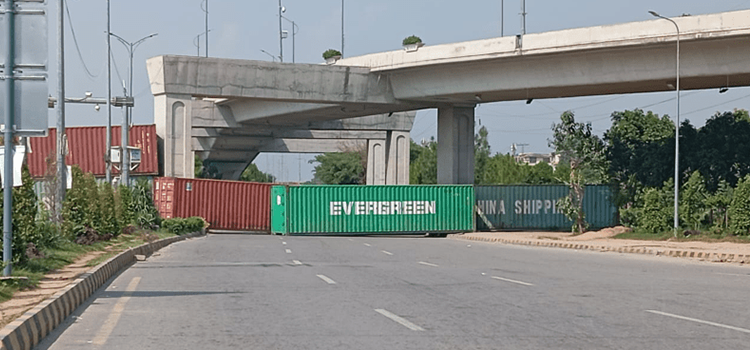Mobile networks were suspended across Islamabad and Rawalpindi on Friday as police sealed off all entry and exit points ahead of the Pakistan Tehreek-e-Insaf (PTI)’s planned rally at D-Chowk. The protest comes despite a ban on gatherings and warnings from the government.
Incarcerated PTI founder Imran Khan once again called on his supporters to gather for a “peaceful protest” in the capital. The PTI has held multiple rallies nationwide in recent weeks, protesting Khan’s imprisonment, the Election Commission of Pakistan’s delayed verdict on reserved seats, and to “save the Constitution.”
The government had earlier issued strict guidelines for PTI protests in Islamabad and Lahore, but the party did not fully comply, leading to clashes between its workers and authorities. In response, Interior Minister Mohsin Naqvi warned PTI against holding any rallies in Islamabad, especially with several foreign dignitaries visiting the city.
Maulana Fazlur Rehman, a veteran politician who has been in contact with PTI recently, also urged the party to delay its gathering until the dignitaries leave Pakistan.
According to reports, mobile services were cut off in the twin cities early Friday morning, causing significant inconvenience for residents, particularly those dependent on digital communication for work. Outage tracking services indicated a spike in disruptions for Zong and PTCL users, concentrated near Rawalpindi.
Police blocked major roads leading to Islamabad’s Red Zone, including Serena Hotel, Jinnah Avenue, Marriott Hotel, and Zero Point, as well as entry points such as Srinagar Highway, Faizabad Chowk, and 9th Avenue. Security was heightened in Rawalpindi, where City Police Officer Khalid Hamdani confirmed that pillion-riding had been banned and public transport, including the metro bus, suspended indefinitely.
Islamabad police reminded the public via their X (formerly Twitter) account that Section 144 was in force, urging citizens to avoid involvement in any illegal gatherings. The authorities reiterated that strict action would be taken against those disrupting public peace and order.
Earlier in the week, Islamabad authorities had implemented Section 144 and the Peaceful Assembly Act, prohibiting large gatherings in key areas of the capital. The Red Zone and surrounding high-security areas were declared off-limits for rallies.
Despite these measures, PTI caravans departed from various cities across Khyber Pakhtunkhwa (KP), with leaders, including KP Chief Minister Ali Amin Gandapur, vowing to reach D-Chowk. Imran Khan, in a message posted to his X account, encouraged supporters to join the protest, calling it a “decisive phase” in their fight for “true freedom.” He also urged Lahore residents to prepare for another protest planned at Minar-i-Pakistan the following day.
PTI leader Qasim Khan Suri shared videos of containers blocking Islamabad’s streets, accusing the government of infringing on citizens’ basic right to protest. Visuals from PTI’s Lahore chapter showed party leaders and supporters from KP gathering in cities like Swabi and Bajaur, en route to Islamabad.
In a further effort to restrict PTI’s protests, the Punjab government imposed Section 144 across multiple cities. The restriction, which has sparked criticism from PTI leaders, remains in effect in Mianwali and other areas for seven days, further intensifying the political standoff.
